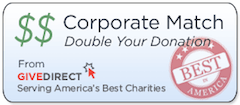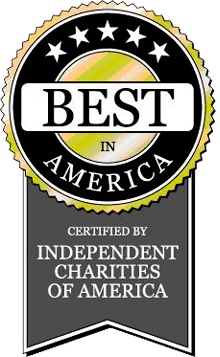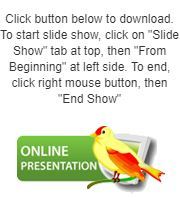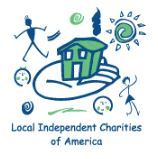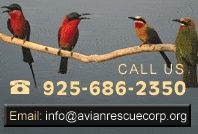Helpful Information & Links
DANGEROUS FOODS
Although we all try very hard to feed our birds the best possible foods, there are times when they may get into something which we didn't plan on them eating. We may even feed them something because we didn't KNOW it was dangerous food.
ALCOHOLIC BEVERAGES - Avoid completely; consumption can lead to brain damage and death. Inhalation of ethanol should also be avoided as this can also cause intoxication and death.
AVOCADO - Avoid completely; consumption is known to have caused death within hours.
CAFFEINE - Includes caffeinated beverages, coffee grounds, and tea bags or iced tea crystals. See symptoms and treatment below under chocolate.
CHOCOLATE - Avoid completely; consumption of small quantities can cause rapid onset of hyperactivity, vomiting, diarrhea, heartbeat irregularities, seizures, and death. The active ingredients causing problems are theophylline and caffeine; the higher the concentration in the chocolate, the more rapid the progression. Usually, the less sugar present in the chocolate, the higher the concentration of toxic active ingredients. If you suspect your bird has ingested chocolate, administer 1 cc of Pepto Bismol and rush your bird to an avian veterinarian.
FAT - Avoid feeding high fat foods; excess fat over time can cause fatty liver disease, obesity, diarrhea and oily feather texture. Excess fat in the diet can also interfere with the absorbtion of other nutrients, such as calcium.
RHUBARB LEAVES - Avoid completely; consumption will cause death.
SALT - Consumption can cause excess drinking and urinating, depression, neurologic hyperactivity, tremors, and death. When necropsied, birds with excessive consumption of salt have a great deal of fluid buildup in the brain and are hemorrhaging. Remember, a bird eating one potato chip with salt is comparable to our eating 50 chips!
TEFLON KILLS - Teflon cookware and coated surfaces when heated can give off deadly fumes for birds. DO NOT USE any teflon cooking devices around your bird. Deaths have been reported within minutes of teflon heating up. Search the internet under Teflon for any current information or warnings.
PARROT NUTRITION GUIDE
A proper diet helps insure a happy, healthy life. Parrots need a varied diet for both their physical health and their mental well-being, just like us!! Provide a variety of food sources daily so they can enjoy a change of food (whatever their mood desires) and still get a healthy mix of nutrition. Have a bowl of pelleted food and filtered water always available, then provide a dish of fresh raw vegetables (grated or cut into small pieces) that should be replaced daily. That is the majority of their diet. Occasionally give them a treat of Millet Spray, scrambled egg, some crackers (pepper treats, or Ritz), nuts (unsalted is best), food off the table (bread, vegetables and cooked meats), birdie bread (recipe available upon request), as well as some seed. The occasional foods provide them with the same variety we enjoy at our meals, as well as required nutrients. Avoid milk, as birds lack the enzyme necessary to digest lactose and they may get diarrhea.
The following list (not to be considered complete) of various components of foods, their benefits, as well as what foods they can be found in to provide for good health, along with a list on page 4 of dangerous and deadly foods have been copied from articles from our local Veterinarian.
CARBOHYDRATES: an essential part of their diet. Complex carbohydrates (starches) provide a steady source of energy. They can be found in whole grains: bread, cereals (low in sodium and sugar), pasta and rice. Simple carbohydrates (sugar) provide no nutrition.
PROTEINS: building materials of body tissue, enzymes that regulate growth and functioning. Made up of amino acids. Essential amino acids cannot be manufactured by the body and therefore must be a part of their diet (humans have 8 essential amino acids, the exact number required by the bird species is still unknown). Complete proteins contain at least 8 of the essential amino acids, Incomplete proteins have less then 8. If a bird eats an incomplete protein along with a complete one, its body can combine amino acids to create additional complete proteins (such as peanut butter on whole wheat bread).
Sources: yogurt, low fat cheese and cottage cheese, meat, poultry (chicken, turkey), fish (water packed tuna), dried beans, corn, eggs, nuts, some bread, cereals, beans, rice and pasta.
FATS: provides energy and aids in the absorption of calcium and fat-soluble vitamins (A, D, E and K). A fat free diet is nearly impossible to achieve and would ultimately be unhealthy for your bird. Linoleic acid is a nutrient supplied by fats and cannot be manufactured by a bird's body. Fats are a mixture of 3 types of fatty acids - polyunsaturated, monounsaturated, and saturated. High fat diets are associated with obesity and liver disease. The largest amount of saturated fats are found in foods from animal sources (meat and dairy) and certain vegetable oils (palm and coconut).
Sources: meats, egg yokes, grains, nuts and seeds.
Be careful of feeding seed as more then 10% of your birds diet. Too much seed can contribute to an early death (8-17 years of age, instead of 20-40 years of health).
LINKS TO OTHER SITES
LINKS TO OTHER SITES
Accessories:
- A Birds Life - Toys and Treats
- Avian Accents - Furniture
- Bird Hobbyist Sales Board
- C&L Aviary - Toys and Supplies
- Corners Limited - Custom Cages
- Featherbutt - Toys and Supplies
- Feeding Tech - Toys and Supplies
- JC Hobbit - Perches and Toys
- Manzanita Trees
- Morton Jones Suppliers - Cages and Supplies
- Safeguard Bird Cages
- TJ's Pet Shop - Cages and Supplies
- Bird Cage Store
Breeding Tips:
- Hand Feeding 1
- Hand Feeding 2
- Hand Feeding and all about the Crop
- New Breeder Basics
- Responsibility of Breeding
- Sour Crop
Rescue Operators:
- ASPCA
- Cockatiel Rescue
- Mickaboo Cockatiel Rescue
- Pet Finder
- Pet Rescue
- Rescues and Sanctuaries worldwide
- Parrot Alert
Rescues
Educational Topics:
- Acronyms Spelled Out
- African Grey Forum
- Avian Management
- Chlamydiosis (Psittacosis)
- Communication and Social Behavior
- Feather Picking
- Genetics and Colorings
- Giardia
- Pet Education - Birds
- Sexing a Cockatiel
- Various Articles
- Visually Sexing Cockatiels
- Winged Wisdom Magazine
Chat Rooms:
Shipping:
Veterinarians:
- AAV Members
- Article on Certification and Vet Lookup
- Lafeber - Vet Lookup
- Parrot.com - Recommended Avian Vet's
- Search for a Vet
Food and Health:
- Birds Need People Foods
- Cockatiel Nutrition Guide
- Ellen's Recipe Cook Book
- Fatty Liver Disease
- Gourmet Recipes for Birds
- Harrisons Bird Foods
- Lafeber Bird Foods
- Non-toxic Plant List
- Nutrition
- Poop-Ology, Understanding droppings
- Safe and Dangerous Plant Lists
- Toxic Plants
- ZuPreem Bird Food
Leg Bands:
- Bird Leg Band Directory
- Bird Magazine.Com
- Greater New Orleans Expo
- International Leg Band Regristration
- L&M Leg Bands (major supplier)
- Leg Band Numbers eGroup
- Leg Band Registry
- National Center Leg Band Directory
- National Finch and Softbill Society Leg Bands
Medicines and Poisons:
Miscellanous:



